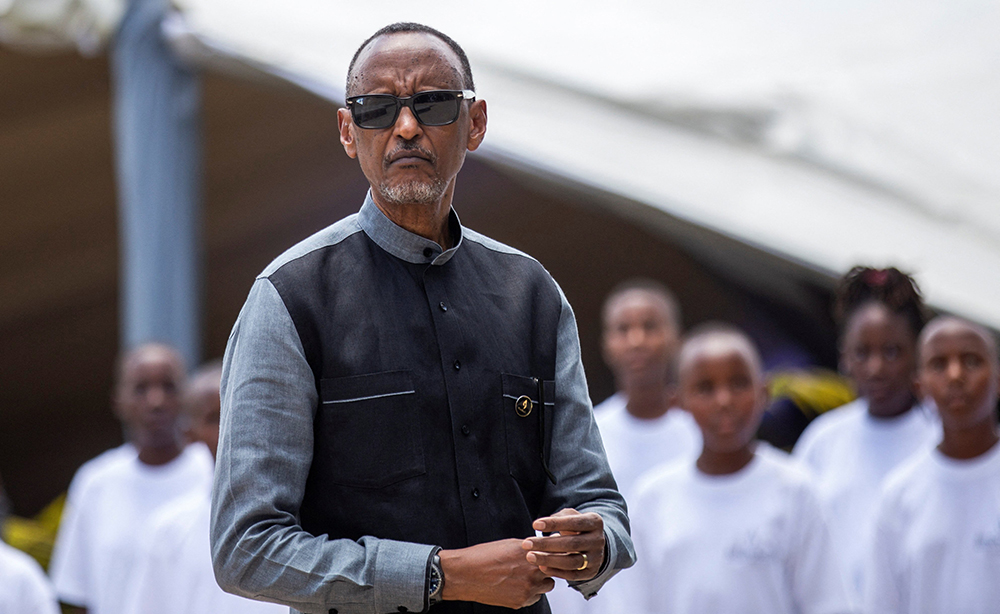
By Fredrick Nzwili
NAIROBI, Kenya (OSV News) — Days after President Paul Kagame of Rwanda warned Catholic pilgrims who “worship poverty” that he would round them up and jail them, Catholic clergy in the East Africa nation remained tight-lipped, even as the warning reverberated across the region.
The clergy, who did not want to be named, said they could not speak on the matter or were “yet to understand” the context of Kagame’s threat or that there was really “not much” in it that should worry the church.
“The church doesn’t think it should be so concerned about this. It chooses to remain quiet,” one of the Catholic priests told OSV News in a telephone interview.
On Aug. 23, in the capital city of Kigali, Kagame told 2,000 youth at the 10th anniversary celebration of YouthConnekt, a platform that seeks to enhance young people’s knowledge, experiences and skills.
“I learned that many young people, as many as thousands … wake up in the early morning, walk for three days to go to (a place) where a vision appeared, a pilgrim land, a place associated with poverty,” Kagame told the youth conference.
“I thought that when you pray, you are praying for what can help improve your lives, praying to get rich and get out of poverty,” he said.
“No one must worship poverty. Do not ever do that again. … If I ever hear about this again, that people traveled to go and worship poverty, I will bring trucks and round them up and imprison them, and only release them when the poverty mentality has left them,” said Kagame, who is himself a Catholic.
The comments drew reactions in social media, as they shocked Catholics across eastern Africa.
When reached by OSV News, several church leaders said they felt the president was not against the church and had spoken to encourage the youth to work hard instead of spending time looking for miracles in shrines. Some admitted he had used “very strong words.”
The prelates, however, refused to go on the record, a sign that they may fear the president’s powers.
The U.S. criticized Rwanda’s dire human rights record In its annual human rights assessment published March 20. In the report, the Department of State said Rwanda operated a prison system that includes harsh and life-threatening conditions, arbitrary detention and serious restrictions on free expression including the imprisonment of journalists. Among of other issues, the report said, Rwanda restricts the freedom of association and has no effective system of collective bargaining.
In a clarification of Kagame’s remarks to youth, Yolande Makolo, the president’s spokeswoman, told Agence France-Presse that the leader “did not at any point mention a specific pilgrimage site, and certainly not Kibeho,” referring to the most famous shrine in this eastern part of Africa. She said he was probably speaking about a little-known site in the western part of Rwanda.
Makolo said the president’s “point was to encourage young Rwandans to be ambitious and work hard, instead of getting caught up in cultlike rituals.”
But in Rwanda, the local media has interpreted Kagame’s reference as pointing to an annual pilgrimage undertaken by thousands of youth to Our Lady of Kibeho shrine, where several Marian apparitions occurred in the 1980s. The Vatican declared the testimonies of three witnesses authentic in 2001.
Since then, Catholics from around the world visit the shrine, the only church-approved Marian apparition site in Africa, hoping to get cure for illnesses and miracles.
Kagame had spoken less than 10 days after the Kibeho shrine attracted thousands for the feast of the Assumption, which was Aug. 15. Large celebrations at the site draw as many as 20,000 pilgrims.
At the same time, the Catholic Church in Rwanda is seeking $3 million to expand the pilgrimage site.
Church sources say Kibeho has developed because of the pilgrimages, which are turning it into a town, with booming businesses and industries.
